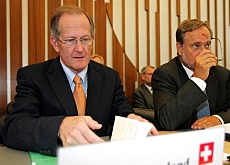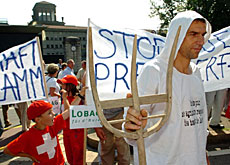WTO farm talks fail to make progress

The group of major food import countries, including Switzerland, has expressed its "disappointment" over a lack of progress in agriculture talks.
The negotiations, which took place in Geneva, are seen as crucial if member countries of the World Trade Organisation are to agree wide-ranging trade liberalisation by the end of the year.
G10 ministers said they remained firmly opposed to “the capping of agricultural tariffs at a specific level”, in response to a proposal earlier this month from the G20 trade bloc of developing countries.
The G10 countries, which account for 13 per cent of world agriculture imports, want to protect their agriculture sectors by retaining a degree of flexibility as to tariffs while maintaining some restrictions on market access.
They also demand that members be allowed to designate “an appropriate number of sensitive [agriculture] products” which would largely be exempt from free trade rules.
“The G10 is prepared to make important concessions in order to further reform agriculture,” the Swiss economics minister, Joseph Deiss, said after the talks.
Movement in other areas
However, he added, “it is inconceivable to make concessions on access to markets if there is no movement in other areas [such as industrial goods and services].”
Switzerland’s senior trade official, Luzius Wasescha, told swissinfo that “tariff reductions should be relatively modest, in order to allow Swiss farmers to adapt gradually to international competition”.
He said the Swiss government’s policy of supporting farmers by making direct payments to them did not appear under threat.
Switzerland is also opposed to allowing market access without considerations for what are known as “non-trade concerns”.
These include food security, rural development and the viability of rural areas – alpine communities in Switzerland – as well as environmental and cultural heritage aspects.
However, Swiss non-governmental organisations, including the Declaration of Bern, criticised the G10 for “failing to fix a date for abolishing export subsidies on agricultural products” while at the same time “demanding developing countries to open their markets to industrial goods and services”.
Negotiations will resume in September, and analysts say significant progress will have to be made if December’s ministerial conference is to be successful.
swissinfo with agencies
G10 members include:
Switzerland
Norway
Japan
Liechtenstein
South Korea
Israel
Iceland
Mauritius
Taiwan
Launched in November, 2001, the Doha round of trade negotiations was to have concluded last year.
However, negotiations failed at the ministers’ conference in Cancun, Mexico in September, 2003.
The 148 members now hope to conclude the round by the end of next year.
The next key stage will be the ministerial conference in Hong Kong at the end of this year.

In compliance with the JTI standards
More: SWI swissinfo.ch certified by the Journalism Trust Initiative











You can find an overview of ongoing debates with our journalists here . Please join us!
If you want to start a conversation about a topic raised in this article or want to report factual errors, email us at english@swissinfo.ch.